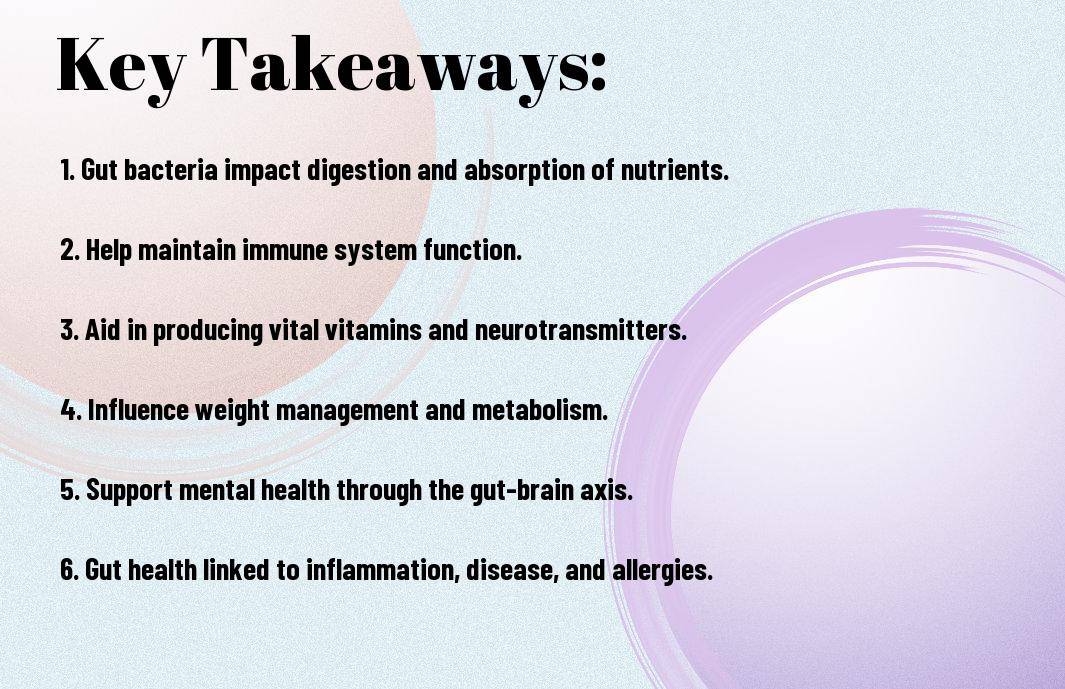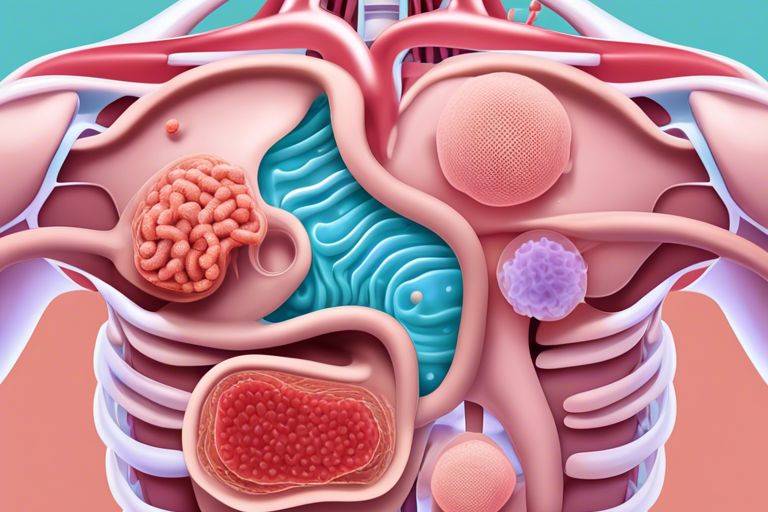
Newsletter Subscribe
Enter your email address below and subscribe to our newsletter

Enter your email address below and subscribe to our newsletter

Bacteria may not sound like something that benefits our health, but when it comes to the trillions of microorganisms living in your gut, they play a crucial role in keeping you healthy. These gut bacteria impact everything from digestion to immunity, and even mental health. By maintaining a balance of good bacteria, you can improve your overall well-being and reduce the risk of diseases like obesity, diabetes, and depression. Let’s investigate into why nurturing your gut microbiome is important for a thriving body and mind.


While How Your Gut Health Affects Your Whole Body may not seem obvious, the gut and brain are deeply interconnected. Research has shown that the gut has a significant impact on our mental health, mood, and cognitive function. The gut-brain axis is a complex communication network linking the emotional and cognitive centers of the brain with peripheral intestinal functions.
Any disruptions in the gut can send signals to the brain, influencing mood, behavior, and even the way we think. This two-way communication system is crucial for overall well-being and highlights the importance of maintaining a healthy gut environment.
An imbalance in gut bacteria can lead to mood disorders like anxiety and depression, as well as cognitive impairments. The gut produces neurotransmitters such as serotonin and dopamine, which play a crucial role in regulating mood and cognition. When gut bacteria are imbalanced, these neurotransmitter levels can be disrupted, leading to mental health issues.
Understanding the connection between gut bacteria and mental health is crucial for maintaining overall well-being. Research has shown that probiotics and a diet rich in fiber can help promote a healthy gut microbiome, leading to improved mood and cognitive function. Additionally, reducing stress levels and getting regular exercise can also support a healthy gut-brain axis.
One of the key ways gut bacteria influence our immune system is through the Gut-Associated Lymphoid Tissue (GALT). This network of cells and tissues in our intestines plays a crucial role in regulating immune responses and defending against pathogens.
Immune system function is closely intertwined with the microbiome, the community of beneficial bacteria in our gut. Gut bacteria help fight infections by crowding out harmful pathogens, producing antimicrobial compounds, and priming our immune cells for battle.
Plus, studies have shown that certain strains of gut bacteria can directly stimulate the immune system, enhancing its ability to recognize and eliminate pathogens. This process is vital for maintaining a strong immune response and overall health.
After you eat a meal, your gut bacteria play a crucial role in breaking down the food you consume. They help in the process of digestion, breaking down complex carbohydrates, proteins, and fats that your body can’t do on its own. This breakdown is imperative for your body to absorb the nutrients it needs to function properly.
Breaking down the food is just the beginning; your gut bacteria also play a key role in producing vitamins and hormones that are crucial for your overall health. They produce imperative vitamins like vitamin K and some B vitamins. Additionally, certain gut bacteria can influence the production of hormones that regulate various bodily functions, including metabolism and mood.
It is fascinating to note that the gut bacteria in your digestive system are not just passive bystanders but active contributors to your health. They are responsible for synthesizing vitamins that your body cannot produce on its own, such as vitamin K and certain B vitamins. Moreover, specific strains of gut bacteria are involved in producing hormones that influence various aspects of your health, from digestion to mood regulation. This symbiotic relationship highlights the imperative role gut bacteria play in maintaining your overall well-being.
To understand the impact of gut bacteria on inflammatory diseases, let’s examine into the relationship between gut bacteria and autoimmune disorders. Bacteria in the gut play a crucial role in regulating the immune system. An imbalance in the gut microbiota can lead to the development of autoimmune conditions, where the immune system mistakenly attacks the body’s own tissues.
To emphasize the importance of gut bacteria in inflammatory diseases, it’s crucial to explore how they can either worsen or alleviate inflammation in the body. Between the spectrum of exacerbating or mitigating inflammation, certain strains of gut bacteria can exert powerful influences. These bacteria can either promote inflammation, leading to conditions like inflammatory bowel disease, or reduce inflammation, potentially helping to prevent or manage these diseases.
For instance, studies have shown that the presence of certain beneficial bacteria, such as Bifidobacteria and Lactobacilli, can help to reduce inflammation in the gut by producing anti-inflammatory compounds. On the contrary, an overgrowth of harmful bacteria like Escherichia coli can exacerbate inflammation and contribute to the progression of inflammatory diseases. Therefore, maintaining a healthy balance of gut bacteria through a diverse and nutrient-rich diet is crucial for supporting overall gut health and preventing inflammatory conditions.

Despite their life-saving capabilities, antibiotics can have a detrimental effect on the balance of gut bacteria. An overuse of antibiotics can disrupt the microbiome, leading to a decrease in beneficial bacteria that are necessary for digestion and overall health.
Effects of modern lifestyle, such as poor dietary choices and high stress levels, can also impact the balance of gut bacteria. It is necessary to prioritize a diet rich in fiber, fruits, and vegetables to support a diverse microbiome. Additionally, managing stress through practices like mindfulness and exercise can help maintain a healthy gut flora.

All
For optimal gut health, incorporating fermented foods and probiotics into your diet is crucial. Fermented foods like yogurt, kefir, sauerkraut, and kimchi contain live beneficial bacteria that can help improve your gut microbiome. Probiotic supplements can also be beneficial in restoring and maintaining a healthy balance of gut bacteria.
Bacteria
For a diverse and healthy gut microbiome, focus on consuming a variety of fibrous foods, whole grains, and colorful fruits and vegetables. Additionally, include prebiotic foods like garlic, onions, and bananas in your diet to feed the good bacteria in your gut. Limiting processed foods, sugar, and artificial sweeteners is also important for maintaining a healthy gut. Knowing what promotes a diverse gut microbiome can help support your overall well-being.
This
Knowing how to nourish your gut microbiome can positively impact your overall health and well-being. By incorporating fermented foods and probiotics, as well as following a diet rich in fiber and prebiotics, you can support a diverse and healthy gut microbiome. Prioritizing your gut health can have far-reaching benefits for your immune system, digestion, and even mood.
Conclusively, taking care of your gut bacteria is crucial for your overall health. By consuming a diverse range of plant-based foods, including probiotics and prebiotics, you can support a healthy gut microbiome. This, in turn, can positively impact your digestion, immune system, mood, and even weight management. Be mindful of, a happy gut equals a happy you!
A: Gut bacteria are microorganisms that reside in the gastrointestinal tract and play a crucial role in digestion, nutrient absorption, and immune function.
A: Gut bacteria help maintain a healthy gut microbiome, which is imperative for proper digestion, immune system function, and overall well-being.
A: Gut bacteria aid in breaking down food particles, synthesizing vitamins, and absorbing nutrients in the intestines, which are crucial for proper digestion.
A: Yes, emerging research suggests a connection between gut bacteria and mental health, indicating that an imbalance in gut bacteria could contribute to conditions like anxiety and depression.
A: Factors such as poor diet, stress, antibiotics, and lack of sleep can disrupt the balance of gut bacteria and have a negative impact on overall health.
A: Consuming a diverse range of fiber-rich foods, probiotics, and fermented foods, staying hydrated, managing stress, and getting enough sleep can help support a healthy gut microbiome.
A: Symptoms such as digestive issues (bloating, gas, constipation, diarrhea), frequent infections, fatigue, and mood changes could indicate an imbalance in gut bacteria and an unhealthy gut microbiome.